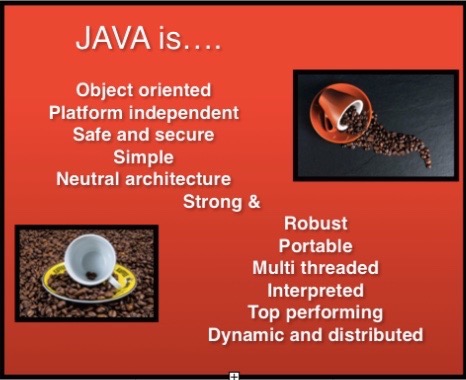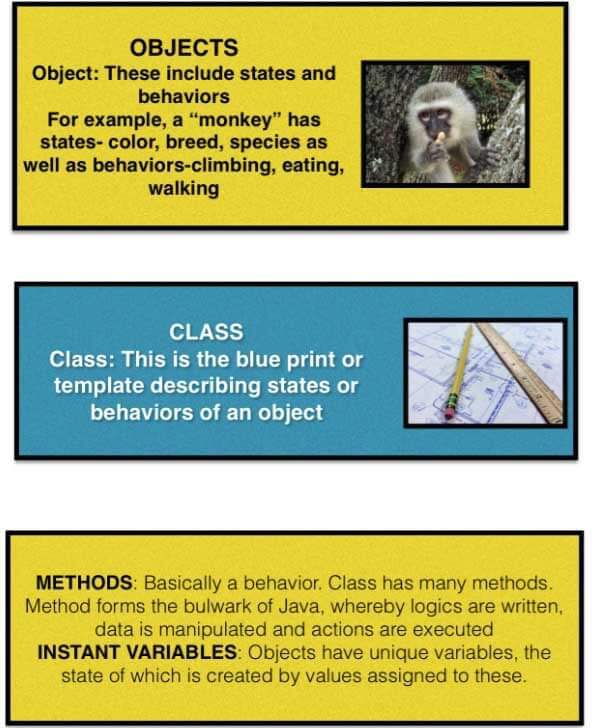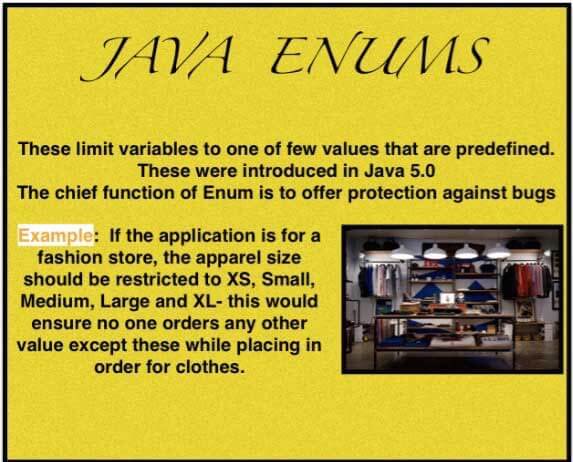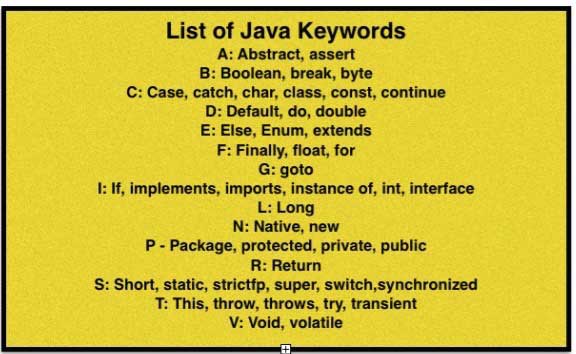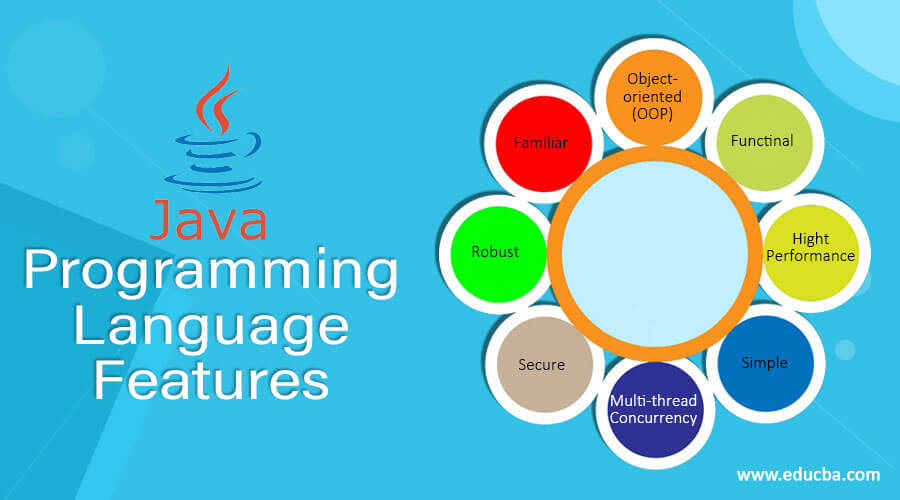
Introduction to Java Programming Language
Java (another word for “coffee”) is also a programming language that is the base for nearly every kind of networked app. Want the perfect Java recipe book? Eager to know what’s brewing and which are the latest trends in this programming language? Learn more about Java programming language features designed initially for entertainment appliances here.
Features of Java Programming Language
Below are the features of the Java Programming Language:
#1: Java was born from a language named Oak
- Oak was originally a platform-independent language for communicating with video game consoles, VCRs, and other recording appliances.
- Meanwhile, the World Wide Web’s reach expanded, and Oak’s developers, James Gosling and his team, shifted their focus to the Internet.
- Oak became Java and WebRunner. The Oak-enabled browser transformed into another avatar: the HotJava web browser.
- Java was invented in 1992 after Oak (named for the tree outside Gosling’s window) underwent a transformation.
- Legend has it that Java was named at a cafe the development team used to visit, and the magic number “0xCafeBabe” in the class files is the specific name of the coffee house.
Java was developed at Sun Labs, where the team started a “clean up” of C++ and ended up with a whole new language and runtime.
#2: There are a host of Java sites for aspiring developers
Sun’s main technology site is java.sun.com. The collaborative site run by Sun is known as java.net. An advocacy or news site run by Sun is java.com/. For Java programs-related news, log on to www.javaworld.com.
#3: Java is a programming language with unique features
Java forms the foundation for developing and delivering embedded and mobile applications, Java game programming, web content, and enterprise software. Java has close to 9 million developers worldwide. From laptops and PCs to gaming consoles and supercomputers, the aroma of Java permeates just about everywhere. Programming in Java is all of the following:
#4: Java Basic Syntax involves 4 components- object, class, methods, and instant variables
The method comprises the header and the method body. All parts of a method are as follows: modifiers and return type.
Exception handling is a key feature of Java in that the method catches an exception using a blend of try-and-catch keywords. A try/catch block is placed around the code, making it a protected code that generates an exception.
#5: Java programming language features are case-sensitive
All Program Java components, such as classes, variables, and methods, are called identifiers.
As Java is a case-sensitive language, identifiers would differ depending on whether the upper or lower case is used. For example, “hello” would differ in meaning from “Hello.” Identifiers should begin with a letter (A or a), currency character($), or underscore (__). One should know that keywords cannot serve as identifiers.
Examples
Legal identifiers, i.e. those that work- _value, $salary
Illegal identifiers, i.e. those that malfunction- KLM123, #AB2
After the first character, identifiers can have any character combination.
Class Names: the First letter should be in the upper case for every class name. If a class has several words in its name, each inner word’s first letter must be in the upper case.
Method Names: These should start with lowercase letters. Where there are several names to form the method, each inner word must be in the upper case.
File Name: Names of program files should match the class names; otherwise, the program will not compile.
For example, if the class name is “MyJavaProgram”, the file should be saved as “MyJavaProgram.java.”
There are 2 categories of modifiers, namely access and non-access.
Examples
Access Modifiers: default, public, private
Non-Access Modifiers: final, abstract
The 4 access levels are as follows:
- Visible to package (the default). Modifiers are not necessary.
- Visible to class alone (private)
- Visible to everyone (public)
- That which is Visible to the package plus subclasses (protected)
The 3 kinds of variables in Java are as follows:
- Local variables
- Class/static variables
- Instance/Nonstatic variables
Java Arrays: These are objects that store many variables at the same time through an Array, which is an object on the heap itself.
Example of Java Enum syntax:
public enum Level {High, Medium, Low}Enums can be on their own or within a class. Methods, constructors, and variables can also be defined within enums.
In Java development, keywords are reserved words that cannot be used as constants, variables, or other identifier names.
Types of Comments in Java
Java supports multiple as well as single-line comments in a manner similar to C and C++ programming. Java compiler ignores characters inside the comment.
#6: Java has different types of built-in data, including strings, numbers, integers, and booleans
There are 2 data types in Java, namely Primitive Data Types and Reference/Object Data Types.
8 primitive data types are supported by Java, predefined by the language, and named via keyword. These are:
- byte
- int
- float
- long
- short
- double
- char
- boolean
Reference Data Types
- These are variables created using defined constructors within the classes and are employed for accessing objects. These variables cannot be changed because they are of a certain type. For example, the Employer, Employee, etc.
- Class objects and various array variables also come under reference data type.
- Null is the default value of a reference variable. The reference variable refers to the object of the declared or new compatible type.
Literal is a source code representation belonging to a fixed value represented directly in the code in the absence of computation. Literals can be assigned to primitive type variables. String literals in Java are specified by enclosing a sequence of characters between double quotes. An example of the string literal is “Hello There.” Java programming language features also support special escape sequences for string and char literals.
Types of Operators
- Arithmetic Operators: The following arithmetic operators in Java: addition, subtraction, multiplication, division, modulus, increment, and decrement.
- Relational Operators
- Bitwise Operators
- The Bitwise Operators
- Logical Operators
- Conditional/Ternary Operators- Consist of three operands and help for the evaluation of boolean expressions.
- One writes this operator in the following way:
variable x=(expression)?value if true: value if false
- instanceOf Operator – This one comprises the description of whether an object is of a particular type (class or interface). This operator is written as:
(Object reference variable) instanceOf (class/interface type)
Loop Troop: while, do…while, for, enhanced for
Keyword Types: break, continue
While the break keyword is for stopping an entire loop and must be used within the loop or switch statement, continue the keyword is used in loop control structures using the loop to jump to its next iteration.
Types of statements: if, if…else, is…else if…else, nested if…else, switch.
#7: Java is all about learning the core before moving on to the advanced level
Understanding what core Java is about is a must before mastering this programming language. So what are the core concepts? Well, they are as follows:
- Object-oriented programming concepts ( this includes abstraction, containment, inheritance, encapsulation, and polymorphism).
- Reasons why Java is a platform-independent language that can be run on all OS like Mac, Windows, and Unix
- Manner and Nature of Java Virtual Machine
- Understanding the Java collection framework
- In-depth knowledge of data types and a few Java lang classes like String, System, Math, etc
- Coding Competitions
Mastering Java is all about putting theory into practice. Simple coding exercises are good to begin with. Still, suppose you have to get the perfectly brewed recipe. In that case, you need to try out different types of logic exercises ( for example, finding prime numbers between 1 to 2000, creating a Fibonacci series, computing number factorials, and more) and file input/output exercises such as listing files, reading and displaying files on console, creating a file with the content. It would help if you tried string manipulation exercises such as parsing numbers from strings, replacing part of the string and building number pyramids, or creating 2 player text-based games.
Next are the servlets and JSP, which are good standard APIs. JSF or JavaServer Faces is a web framework helping in user interface simplification for Java web applications. Building web-based applications is next, and these can be presentation or service-based. It takes very little time for programming skills to go obsolete. This is why Java programmers should try to keep in touch with the current trends to gain an edge over others. The mastering theory will not help you; applying it will.
#8 Software developers all over the world use Java
Java has been refined further, tested considerably and extended, and proven by a whole range of software developers and architects. This programming language ensures the development of high-performance apps for numerous computing platforms. Advanced Java can boost productivity, communication, and partnership, besides reducing enterprise and consumer applications.
So, why does Java score over the others?
- You can write and run Java programming language features and software on any platform.
- Users can create programs running within a web browser and access available web services apart from developing server-side applications for online polls and commerce firms. HTML forms processing and much more.
- One can write customized apps using Java and write efficient applications for every type of electronic device, including wireless modules and mobile phones.
- Numerous colleges and universities offer Java programming courses. Notable among them is the Oracle Academy, which provides support, training, and certification to K12 vocational and higher education institutions for teaching purposes.
Developers can further sharpen their skills and learn Java programming language features on how to come up with the perfect cuppa by reading the Java web developer site developed by Oracle and also subscribing to Java technology-focused newsletters and magazines using the Java tutorial or signing up for virtual, taught or web courses and/or certifications. There are also many visual education tools, such as BlueJ and Alice, to impart training in this programming language to developers.
#9: Java has significant language features that offer benefits to users
Platform independence means compilers do not have to produce native object code for platforms but instead develop bytecode instructions for Java Virtual Machine. Java Programming language features is an object-oriented language with a rich standard library and language support for progressive Java programming language features, such as strings, threads, arrays, and exception handling.
- Java is easy to master, and there are numerous classes and methods in six key functional areas that have to be learned.
- Input/output classes are there to read and write data from numerous sources, and networking permits communication across computers online or through a LAN.
- Platform-independent GUI applications can be created through Java’s Abstract Window Toolkit.
- Java Applet is a special class that lets you come up with downloadable simple Java programs that can be run on client browsers.
- The applet is also perfect for a stand along with apps and the creation of programs that can be downloaded on the web page and run on browsers.
- Java is very much like its popular kin C++ as far as syntax is concerned. This has made it very easy to use.
- Moreover, this programming language does not require free dynamically allocated memory, creating fewer memory errors and making the programs simpler to write.
#10 Java can be used anywhere and everywhere
Education, embedded systems, application programming, and simulation are some of the many areas where Java basics can be applied. Areas of application include network apps, WWW Applets, Cross-platform app development, and more. Java codes is a programming language, virtual machine, and API specification. One of the biggest advantages of this language, making it easy to use across numerous settings, is its high level of security and safety. Interpreters apply numerous tests to the compiled code to check for illegal codes, and this has the following advantages:
- The compiled code causes no operand stack over or underflow
- It performs legal data conversions and only legal object field access
- All upcode parameter types undergo checking so that they are legal
Another property of Java development that lends itself to multiple platforms is the top performance. Java Programming Language basics environment compiles the bytecode into native machine code at runtime.
Conclusion
Java Programming Language basics are much more than a usual programming language. It is a multi-platform unique programming language with inbuilt security to prevent hacking. From a safety point of view as well as convenience, Java clearly scores over other programming languages. So, if you need a pick-me-up in the virtual world, Java coding is the programming language that will leave your cup more full than empty in every way!
Recommended Articles
Here are some further articles to learn more:

